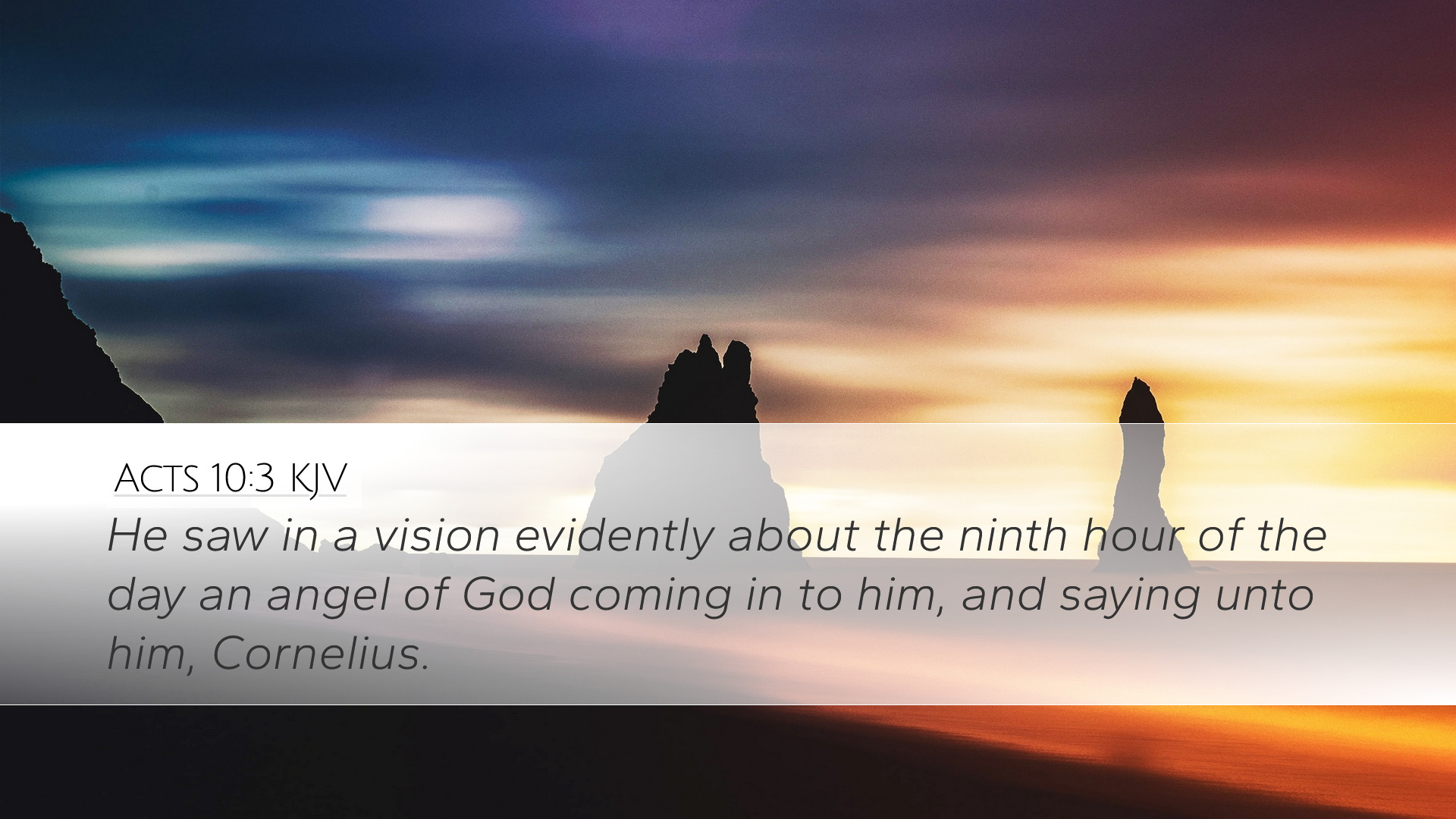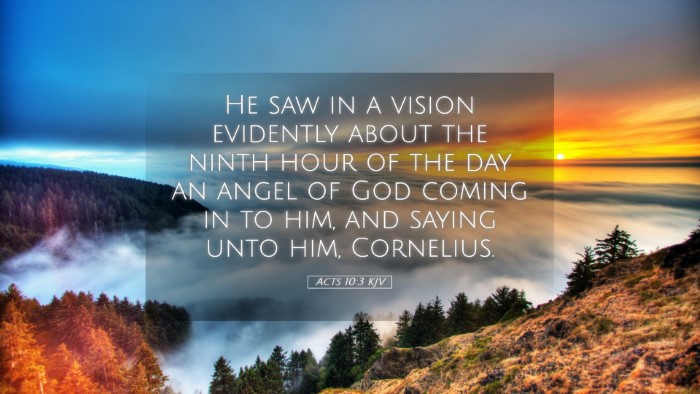Commentary on Acts 10:3
Acts 10:3 (KJV): "He saw in a vision evidently about the ninth hour of the day an angel of God coming in to him, and saying unto him, Cornelius,."
Introduction
The passage in Acts 10:3 describes a pivotal moment in early Christian history. The vision given to Cornelius indicates a significant shift in God’s plan, broadening the mission of the Church to include Gentiles. This commentary will explore the multilayered meanings of this verse by drawing insights from public domain commentaries by Matthew Henry, Albert Barnes, and Adam Clarke.
Contextual Background
Before delving into the specifics of the verse, it’s important to consider the broader context within which it sits:
- The Dramatis Personae: Cornelius is a centurion in the Roman army, described as a devout man who fears God. This depicts the early spread of Christianity among non-Jews.
- The Timing of the Vision: The vision occurs around the ninth hour of the day (3:00 PM), which was a time of prayer among Jews. This indicates a spiritual significance to the timing.
- The Role of Angels: The angelic visitation signifies God's direct involvement and the important new direction for the early Church.
Commentary Insights
Matthew Henry’s Perspective
Matthew Henry emphasizes the divine initiative in calling Cornelius, noting that the Lord selects individuals for His purposes. The vision serves as a testament to God's impartiality in choosing who He can use in His plans. Henry states, “God who sees men’s hearts can notice and value their piety and prospects of faith.” Thus, even as a Gentile, Cornelius is recognized and called by God.
Albert Barnes’ Interpretation
Albert Barnes notes that the term "evidently" indicates the clarity and certainty of the vision experienced by Cornelius. Barnes highlights the nature of the angel's message, as it calls Cornelius by name, which signifies personal attention and value. He elaborates on the theological implications, suggesting that this vision is part of God's unfolding plan to extend the gospel beyond the Jewish people.
Adam Clarke’s Analysis
Adam Clarke provides an extensive examination of the significance of the ninth hour of prayer, noting its importance in Jewish tradition. He also references the angel’s appearance as heralding a critical turning point where the Gentiles would be integrated into the community of faith. Clarke points out that the vision not only serves as a call to Cornelius but also prepares him for the reception of Peter, who would further fulfill this divine initiative.
Theological Implications
Acts 10:3 holds great theological significance for understanding the nature of God’s outreach and mission:
- Divine Sovereignty: This passage illustrates God's sovereignty over history and His ability to orchestrate events in a manner that fulfills His redemptive plan.
- Inclusiveness of the Gospel: The vision acknowledges that God's love and salvation extend to all humanity, focusing a spotlight on the Gentiles.
- Prayer as a Gateway: Cornelius’s devotion and prayer life underline the importance of seeking God, which serves as an avenue for divine interaction.
Practical Applications
The insights from Acts 10:3 can be applied in various practical ways for pastors, students, and theologians:
- Encouragement in Prayer: Just as Cornelius was a man of prayer, believers should be encouraged to cultivate a life of prayer, understanding that God hears and responds.
- Understanding God’s Calling: This narrative invites believers to contemplate their own God-given callings and how they may be called to reach out to others, regardless of their background.
- Embracing Diversity: The shift towards including Gentiles in the faith serves as a lesson in welcoming diversity within church communities today.
Conclusion
Acts 10:3 encapsulates a momentous occasion in the early Church, illustrating God's willingness to break down barriers for the sake of the gospel. Through the insights of Matthew Henry, Albert Barnes, and Adam Clarke, the richness of this verse reveals profound truths about prayer, divine calling, and the inclusivity of the Christian message. By understanding and applying these insights, believers can more deeply engage with the call God places on their lives and the mission He has entrusted to His Church.


